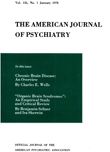Growth Hormone and Prolactin in Unipolar and Bipolar Depressed Patients: Responses to Hypoglycemia and L-Dopa
Abstract
In response to both insulin-induced hypoglycemia and the ingestion of 500 mg. of L-dopa, unipolar depressed patients (most of whom were postmenopausal women) secreted significantly less growth hormone (GH) than did normal subjects or bipolar depressed patients in the same age range (45 to 70 years). Prolactin responses to L-dopa were normal for nearly all subjects. Since it is believed that prolactin responses to L-dopa are mediated by brain dopamine and GH responses by brain norepinephrine, the data tend to support the hypothesis that there is a disturbance of brain norepinephrine metabolism in unipolar depressive illness. However, further study is needed to determine the effects of the menopause on GH secretion.
Access content
To read the fulltext, please use one of the options below to sign in or purchase access.- Personal login
- Institutional Login
- Sign in via OpenAthens
- Register for access
-
Please login/register if you wish to pair your device and check access availability.
Not a subscriber?
PsychiatryOnline subscription options offer access to the DSM-5 library, books, journals, CME, and patient resources. This all-in-one virtual library provides psychiatrists and mental health professionals with key resources for diagnosis, treatment, research, and professional development.
Need more help? PsychiatryOnline Customer Service may be reached by emailing [email protected] or by calling 800-368-5777 (in the U.S.) or 703-907-7322 (outside the U.S.).



